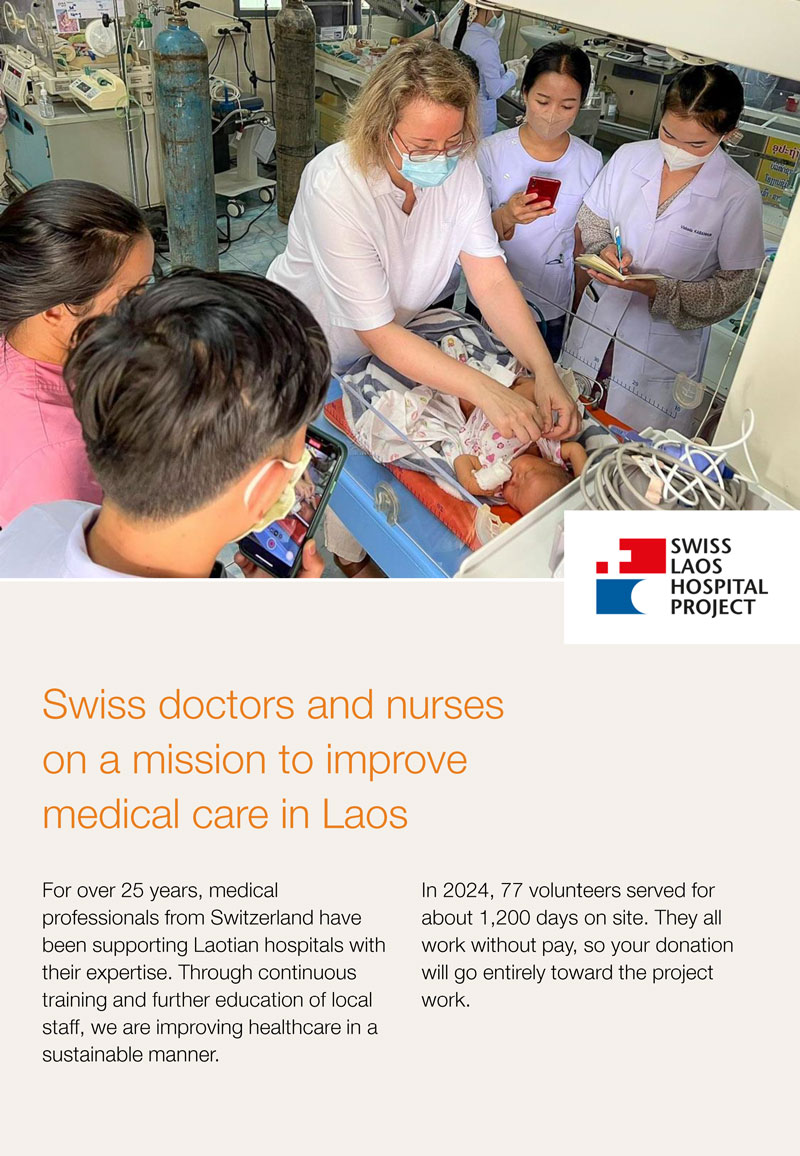

The Swiss Laos Hospital Project
Who we are – and what we do
The Swiss Laos Hospital Project (SLHP) is a Swiss non-profit organization that aims to improve healthcare services in Laos through medical training, professional consulting and financial contributions.
Our staff are doctors, nurses and other specialists who regularly do volunteer work in Laotian hospitals. They specialize in gynaecology and obstetrics, neonatology, internal medicine, psychiatry and hospital management.
Our work is based on a memorandum of understanding with the Laotian Ministry of Health and is aligned with the UN’s Sustainable Development Goals. The SLHP has been organized as an association since 2000 and is funded exclusively by donations.
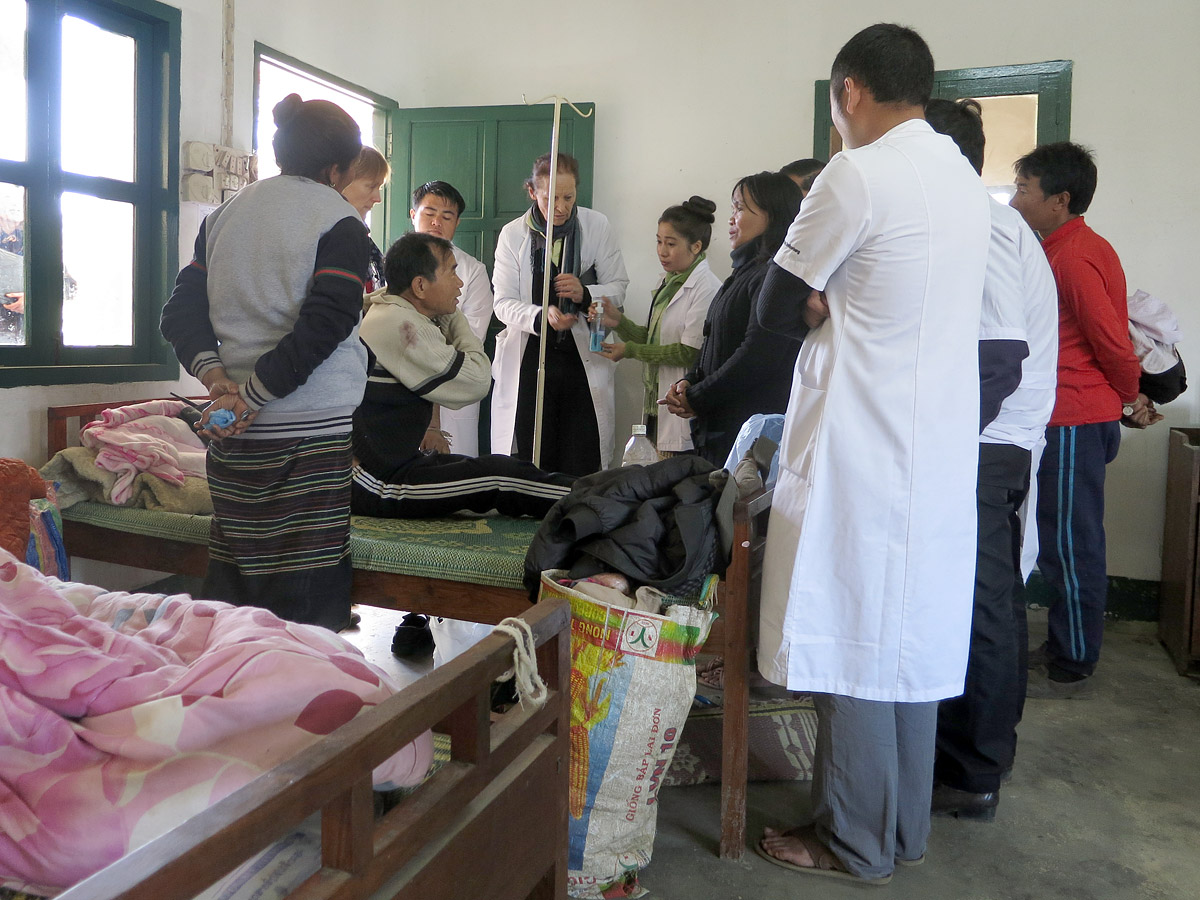
Ward round in the district hospital in Muang Kham: Rooms for 8 patients and very basic sanitary installations are common here.
Our Goal
The Swiss Laos Hospital Project (SLHP) is a medical non-profit organization operating in Laos. Its members are doctors, midwives, nurses, laboratory workers and technicians from Switzerland.
Our goal is to improve the health of mothers and their children in Laos. We aim in particular to lower mortality of mothers and newborns which is 37 and 17 times higher than in Switzerland (2015: 58 of 1’000 children under 5 years, 375 of 100’000 mothers).
The focus of our work lies on gynecology and obstetrics as well as neonatology. Our fields of activity also include internal medicine, psychiatry and hospital management.
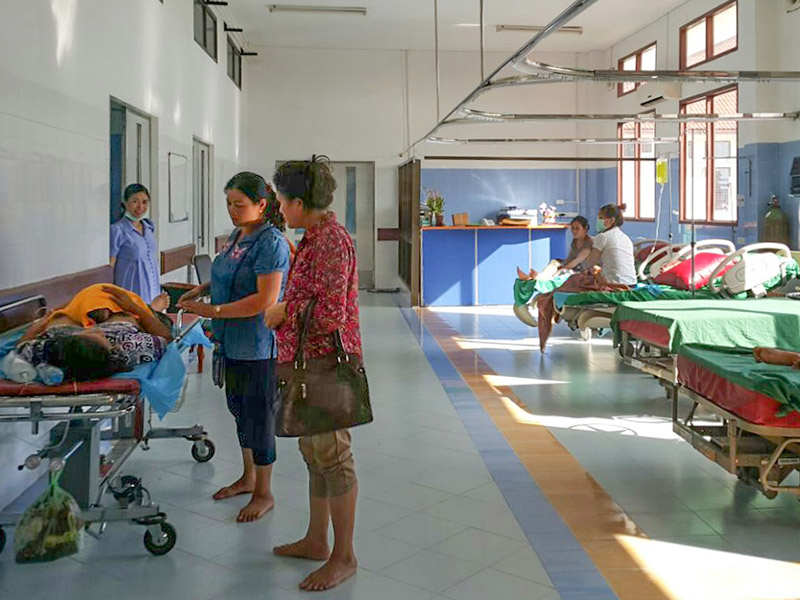
The new Mother and Newborn Hospital in Vientiane Capital is a new benchmark in the healthcare service of Laos.
Our Partner Hospitals
The Swiss Laos Hospital Project does not run its own healthcare institutions, but cooperates with a dozen public hospitals all over the country. Our most important partner is the Mother and Newborn Hospital in Vientiane Capital, where we started a cooperation over 15 years ago. This hospital moved into a new building, partly financed by the SLHP, in 2015. Today, there are about 6’500 deliveries a year in the Mother and Newborn Hospital, and it became the leading training hospital in the fields of gynecology, obstetrics, and neonatology. Since 2003 we have also established seven neonatology departments in hospitals all over the country, the latest went into operation in 2014 in Luang Nam Tha. In the area of general internal medicine, our focus lies in the Xieng Khouang province in the north-eastern part of the country. A team of Swiss family doctors visits the Kham District Hospital since 2008 four times a year. Since 2014 this includes the Nong Het District Hospital as well. In addition we cooperate with the Verein Spitalpartnerschaft Phonsavan (Laos) & Kantonsspital Winterthur KSW: This Swiss association regularly sends medical professionals of the cantonal hospital in Winterthur to teach their colleagues in the Xieng Khouang Province Hospital in Phonsavan.
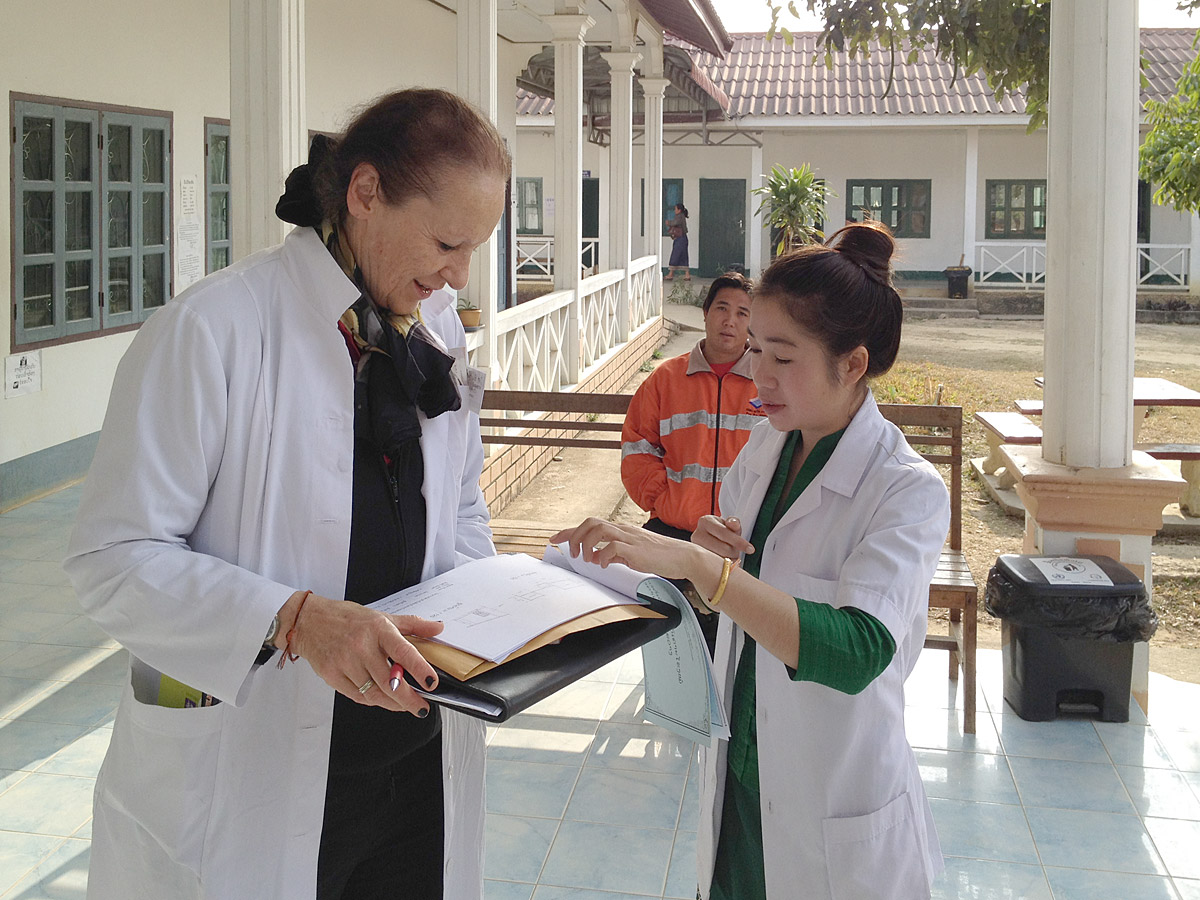
Swiss Laos Hospital Project volunteers work closely with their Laotian colleagues.
Our Way of Working
During emergency relief operations by large organizations, Swiss doctors treat patients directly. In contrast, our aim is mainly passing on our expertise to our Laotian colleagues and accompanying them when they are seeing patients (bedside teaching). This approach involves our local partners in the development of hospital structures in their country, and it motivates them to take responsibility for the application of the knowledge we can provide. Furthermore, our project regularly awards scholarships for three- to six-month medical trainings, most of which are held in Vientiane Capital. Such scholarships are bound to the obligation that the medical professionals return to their hospitals after the training and pass on their new expertise.
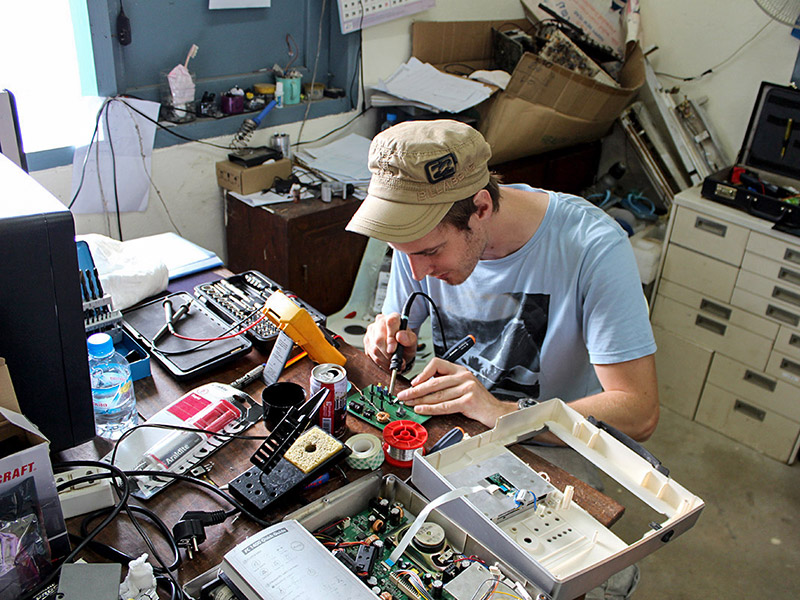
Our volunteers also provide maintenance and repair of medical devices (which often are donations by Swiss hospitals and doctors).
The Use of Your Donations
The Swiss Laos Hospital Project is based on volunteer work. Swiss medical professionals who work in Laos only receive a contribution to their travel costs. Our staff in Switzerland are volunteers as well. As a result, donations – currently about 350’000 Swiss francs per year – almost entirely benefit the projects and the people in Laos.
These donations are used, for example, to pay for scholarships, therapies and medicines (if patients are unable to finance them themselves), the purchase or repair of medical equipment and consumables, and construction projects. All funds are invested directly by our staff on site to prevent corruption.
In addition, the Swiss Laos Hospital Project distributes a birth kit in large numbers all over the country since 2010. This birth kit allows the sterile cutting of the cord of the newborn child even during home births (which still account for 60 percent) and thus prevents infections. It is produced in Laos to support the local economy.
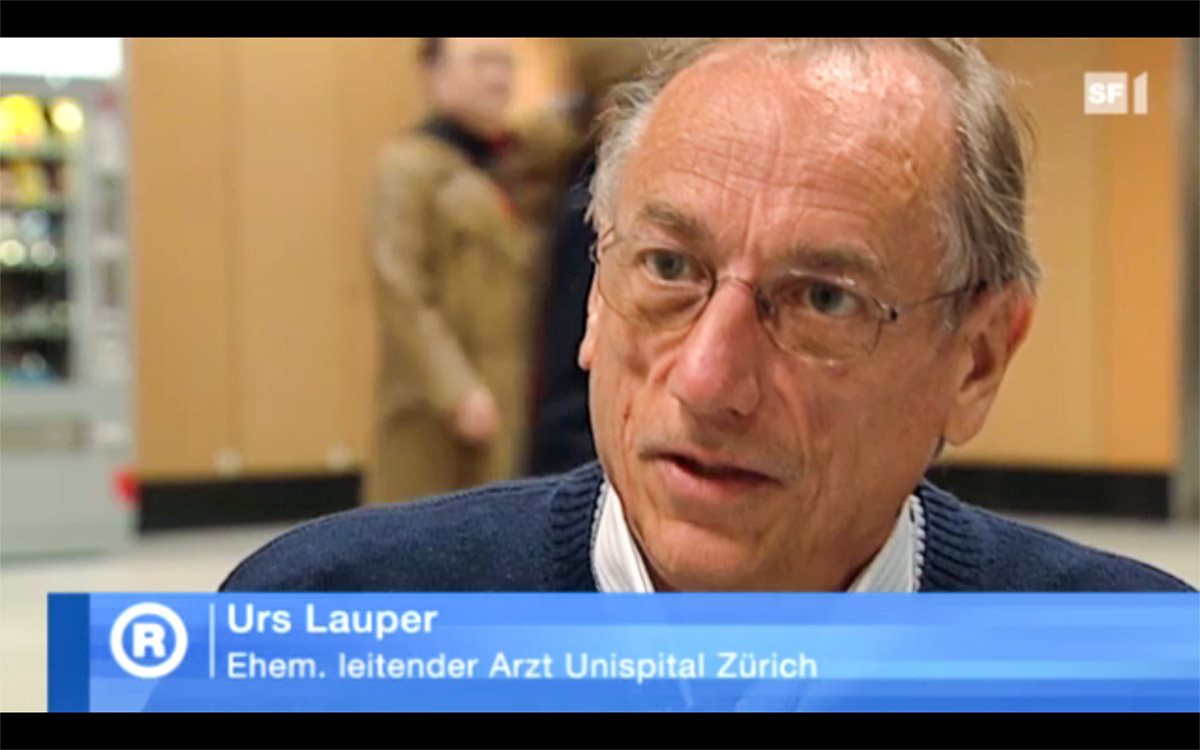
Dr. med. Urs Lauper, founder of the SLHP, in the Swiss television programme «Rundschau» on 12 May 2010.
Our Organization
Founded in 2000 by Dr. med. Urs Lauper (former head physician at the Obstetrics Clinic of the University Hospital Zurich) and constituted as an association in 2003, the Swiss Laos Hospital Project now has about 150 members. It is supported by the Obstetrics and Neonatology Clinics of the University Hospital Zurich and the Gynaecological Association of the Canton of Zurich.
Donations to our project are tax deductible in all cantons. Since 2018, the Swiss Laos Hospital Project has also been certified by Zewo.
The strategic and operational tasks are the responsibility of the board of directors, which is chaired by Dr. med. Marion Mönkhoff, MD.
In 2024, the SLHP has renewed the Memorandum of Understanding with the Lao Ministry of Health, which ensures the continued commitment of our project in this country.
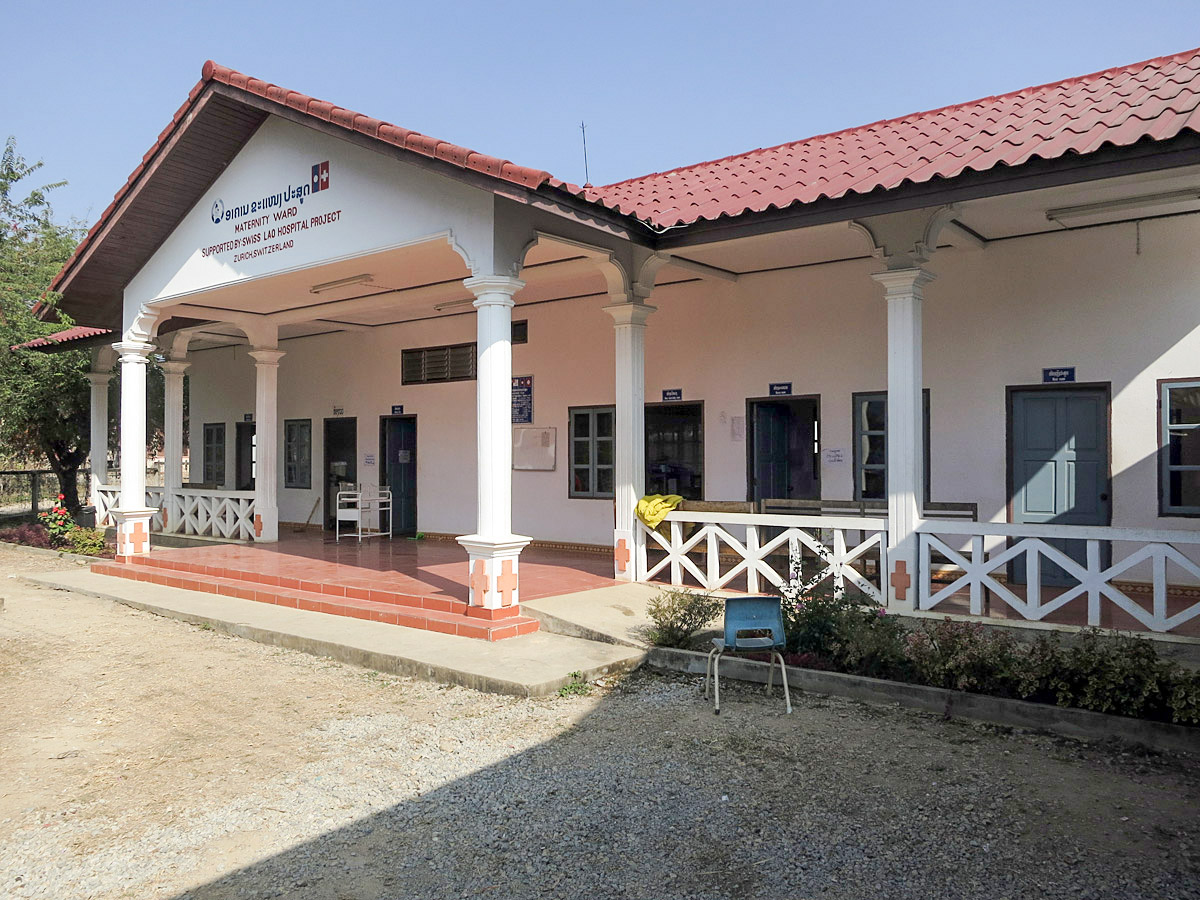
The maternity ward in the district hospital of Muang Kham was partly financed by the Swiss Laos Hospital Project.
Our Achievements
Every year, around 30 medical professionals from Switzerland carry out 40 missions in Laos, with a total of 120 weeks of work on site.
In addition, every year a container filled with 8 tons of donated materials is shipped from Switzerland to Laos. This allowed us for example to distribute almost 50 second-hand ultrasound devices throughout the country. Operating tables for Caesarean sections, incubators, infusion pumps and monitoring monitors from Swiss hospitals and doctors‘ offices are also most welcome in Laotian hospitals.
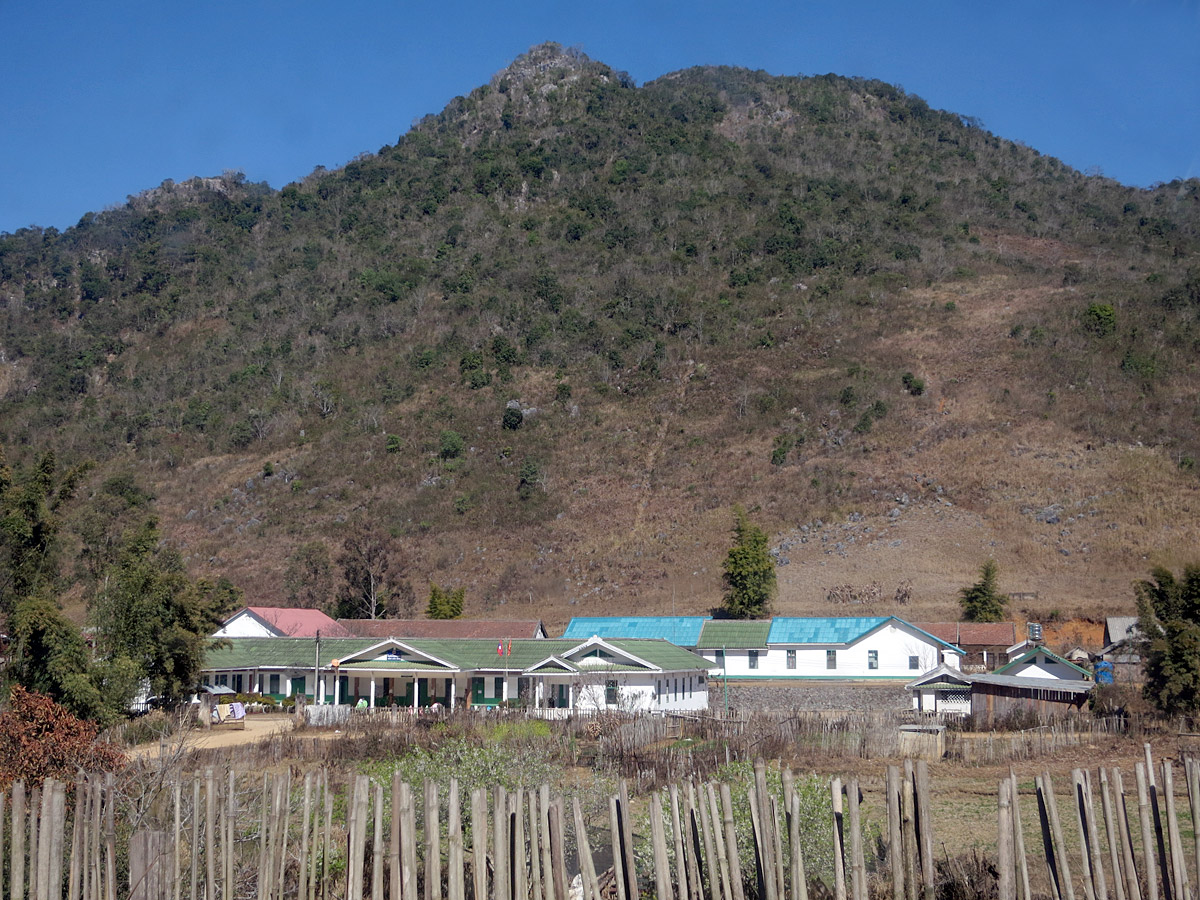
The district hospital in Nong Het in the north-east of the country.
About Laos
The Lao People’s Democratic Republic is a mountainous inland country in Southeast Asia with a tropical climate. Compared to its neighbouring countries (especially Thailand, Vietnam and China), the economy and infrastructure are still underdeveloped, and medical care is also at a modest level. Its 6.8 million inhabitants are spread over an area almost six times the size of Switzerland. Many Laotians practise agriculture and live in very basic conditions with difficult hygienic conditions, often in remote villages that are only connected to the centres by natural roads. During the Vietnam War, the north-east of the country in particular was massively bombed by US forces; unexploded ordnance from this war still causes deaths and injuries today.
Fundraising

Join us as our Head of Fundraising
To support our work, we are looking for a person with experience in fundraising and a connection to the healthcare sector. In this role, you will develop and implement our fundraising measures. In particular, you will research suitable foundations and submit funding applications.
Annual Report 2024
A solid foundation for the next five years
In 2024, we laid the foundations for our work over the next five years. On one hand, we were able to conclude a new Memorandum of Understanding with the Laotian authorities for the years 2024 to 2028. This provides the legal and conceptual framework for our activities in Laos. On the other hand, our board of directors assessed the current state of our activities and defined the strategy for the years 2024 to 2028.
Our five working groups continued their work in Laos with great commitment. A total of 77 specialists from Switzerland traveled to Laos and performed voluntary work there for 1,185 days.
Your Donation

Achieving a lot with little
Our work is only possible thanks to your support. Even small amounts can make a big difference in a country like Laos. The Swiss Laos Hospital Project is based on volunteer work and invests donations directly on site. This way your donation will always reach its goal.

